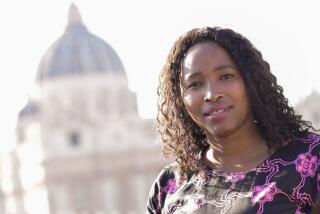RELIGION : Pope’s Appointees Show Change Is Cardinal Virtue
- Share via
VATICAN CITY — Archbishop Jan P. Schotte is a personable, polyglot Belgian prelate who is helping lay the foundation for the 21st-Century Roman Catholic Church as the organizer of papal-summoned international congresses of bishops.
Next Saturday, Schotte, 66, will cross an invisible yet portentous line between churchman and potential Pope when John Paul II elevates him and 29 other bishops from 24 countries to the College of Cardinals.
Schotte, a close papal ally of impeccable credentials, is emblematic of the change that John Paul is bringing to that most exclusive of men’s clubs. The college’s principal task is not only to elect the next Pope, but to produce him as well.
The college has elected one of its members to the papacy without exception since the 14th Century. Thus, like some other newcomers in the Class of ‘94, Schotte becomes papabile the instant John Paul invests him with the cardinal’s trademark red hat.
As he elevates the largest number of new cardinals in almost half a century, John Paul is simultaneously directing a process of renewal and a broadening of horizons for his 2,000-year-old Roman Catholic Church.
Restocked to its maximum 120 voting members, the new college mirrors the church’s changing geographic priorities and John Paul’s attempts to shape its theological future.
Most of the new cardinals share their Pope’s doctrinal conservatism and his preoccupation with what he sees as the growing secularization of consumer societies.
John Paul, 74, should have named cardinals in the spring, but he was hospitalized with a broken leg. In early autumn, he looked increasingly frail but has strengthened recently and is clearly feeling better. This week he outlined spiritual--and travel--plans for the year 2000, and announced a major trip to the Philippines, Papua New Guinea, Australia and Sri Lanka in January.
With his new nominations, John Paul will have appointed 100 of the 120 cardinal electors. There are 47 other cardinals, but they are older than 80--too old to vote for Pope under Vatican rules.
Like those in the new class, about half of the college electors are European. Since the fall of communism, John Paul has focused firmly on Eastern Europe, renewing vacant cardinalates there and creating new ones in countries emerging from Communist totalitarianism with resurgent religion as counterpoint to tattered social fabrics and shattered economies.
The new appointees include a cardinal for Prague who spent eight years as a window washer under Czech Communist rule; Belarus’ first cardinal, who spent 10 years in Soviet prisons, and a 92-year-old Albanian, imprisoned under communism for 37 years.
John Paul has once again used appointments to reinforce his church in places where it is under duress or shows prospects of a comeback. Among the new cardinals are prelates from Bosnia-Herzegovina, Lebanon, Cuba and Vietnam.
The reign of the church’s first Polish Pope has not been kind to historic Italian dominance of the college and the Curia, the Vatican administration. There are three Italian electors among the new cardinals, and Italians--with 20--will remain the largest national group in the new college, but never again will the election of a non-Italian Pope be as startling as when Cardinal Karol Wojtyla of Krakow was elected in 1978.
The Americans will be the second-largest national contingent. Cardinalates for Archbishops William H. Keeler of Baltimore and Adam J. Maida of Detroit raise the number of American electors to 10: eight at home and two at the Curia.
In his numerical and geographic expansion of the college, John Paul has mainly added men who share his conservative vision for the church in the next century. In a real sense, the College of Cardinals will be his spiritual legacy.
More to Read
Sign up for Essential California
The most important California stories and recommendations in your inbox every morning.
You may occasionally receive promotional content from the Los Angeles Times.










